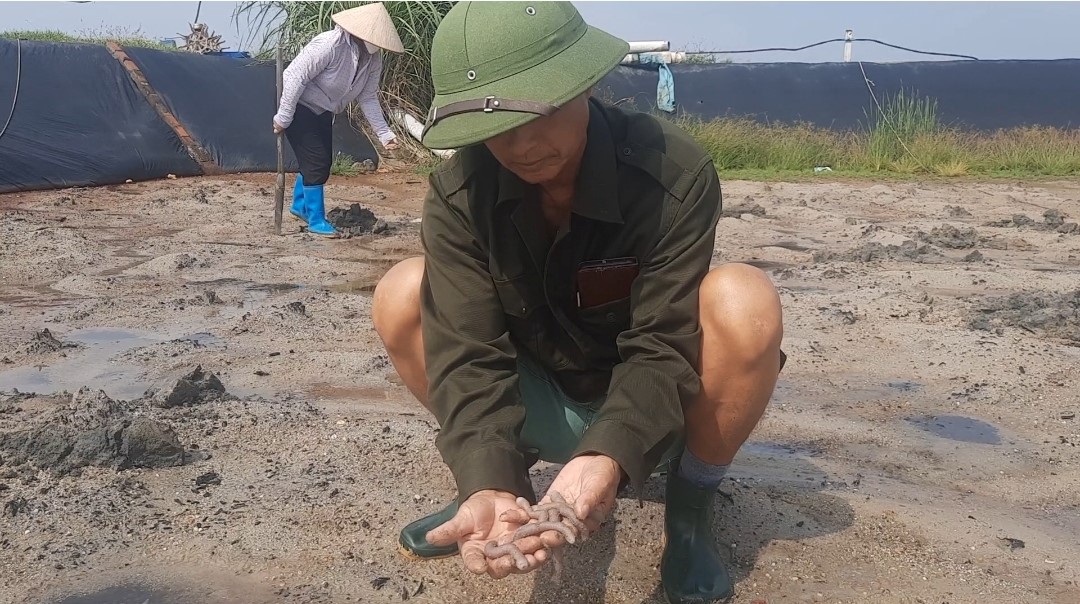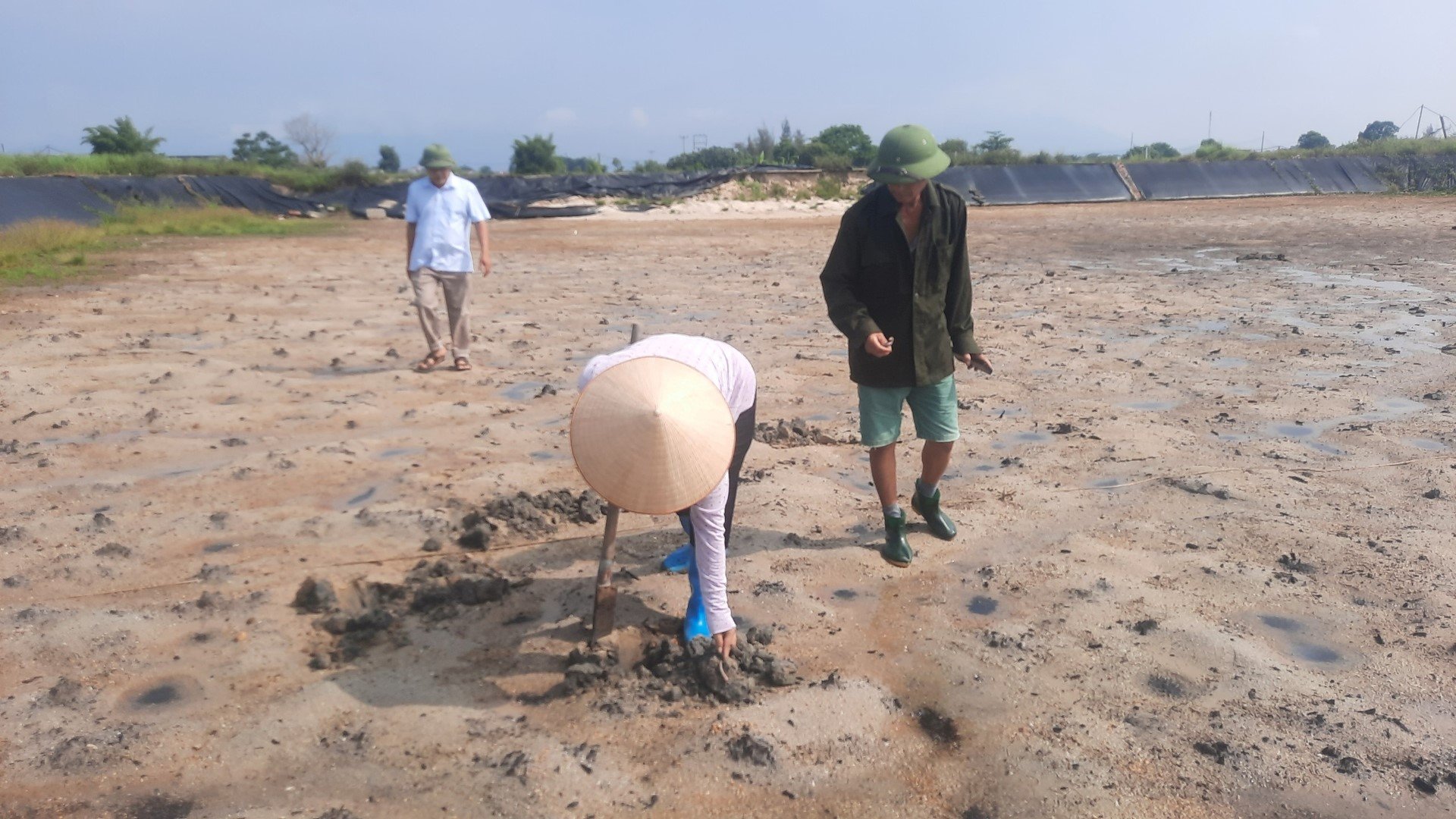May 20, 2025 | 22:55 GMT +7
May 20, 2025 | 22:55 GMT +7
Hotline: 0913.378.918
May 20, 2025 | 22:55 GMT +7
Hotline: 0913.378.918

Mr. Hoang Xuan Thu introduced the model of commercial peanut worm farming. Photo: Nguyen Thanh.
Peanut worms are a type of rare and valuable seafood from the waters of Quang Ninh province, mostly distributed in some localities, such as Van Don, Dam Ha, and Mong Cai. Over the past time, peanut worms have been caught more and more, along with the impact of the environment and water pollution, so this resource has gradually narrowed its living space and is at risk of extinction.
In Dam Buon village, Dam Ha commune, Dam Ha district, Quang Ninh province, Mr. Hoang Xuan Thu is a pioneer in raising peanut worms in earthen ponds. It is known that in 2018, Mr. Thu started pilot farming in an area of 100 m2. Realizing the peanut worms’ good growth, Mr. Thu expanded the model to four ponds with a width of 2500 m2/pond. The food for the worms is pureed trash fish, with a feeding time of about every two months. Each year, a pond can harvest about 500kg of fresh peanut worms, with a selling price of VND 230,000/kg.
Dug peanut worms are immediately purchased at the farming area by traders. In order to exploit peanut worms effectively, Mr. Thu only catches the adult heads. In addition, during the peanut worms’ breeding period around June and July on the lunar calendar, Mr. Thu does not exploit peanut worms to maintain an abundant quantity in the pond. This is a model that brings economic efficiency and creates a stable source of income for people, especially when peanut worms are currently rare and precious seafood with signs of decline in Quang Ninh.
Van Don district currently has more than 2,000 large and small alluvial grounds, which are the living places of the peanut worm species and are also the main source of income for fishermen in the maritime region here. Many families have gotten out of poverty and become rich from exploiting this type of seafood, especially households that purchase and process dried peanut worms.
The price of fresh peanut worms purchased at the alluvial ground is about VND 200,000 - 300,000/kg, depending on the small or big types. Dried peanut worm costs VND 3 - 5 million/kg, depending on the quality. To get 1 kg of dried peanut worms, it takes 10 - 12 kg of fresh peanut worms.

Each of Mr.Thu’s farming ponds has an area of 2500 m2, and each year an earthen pond can harvest 500kg of fresh peanut worms. Photo: Nguyen Thanh.
Almost all activities of people exploiting peanut worms in alluvial grounds are completely spontaneous, without the management of local authorities. Many fishermen also carry suction machines and aerators to alluvial grounds to dig and suck peanut worms and other mollusks, leading to the risk of the extinction of this aquatic resource.
In order to strengthen the protection of peanut worm species, the Quang Ninh Provincial People's Committee issued Decision No. 318/2016/QD-UBND on regulating the list of prohibited fishing methods, professions, and tools and the period of prohibition on exploiting peanut worms in the province.
Accordingly, in order to protect the peanut worm resource, year-round prohibited fishing methods, professions, and tools include: creating caves; digging trenches; digging along the way of peanut worms; measures to pump sand and use high pressure pumps to catch peanut worms, causing the destruction of the peanut worms’ natural habitat; exploiting peanut worms by using sound, light, and chemicals to attract; and using fishing tools other than spades to exploit peanut worms.

Fresh peanut worms at Mr. Thu's model cost VND 230,000/kg. Photo: Nguyen Thanh.
In particular, during the peanut worms’ breeding season, all forms and methods of exploiting natural peanut worms are prohibited. Specifically, prohibiting fishing from June 1 to the end of July 31 every year.
Quang Ninh People's Committee also requested the Department of Agriculture and Rural Development to monitor, inspect, and disseminate information to the people about the protection of aquatic resources and the environment in the sea areas in general and areas with a distribution of natural peanut worms in the province in particular. Localities with naturally distributed peanut worms must direct functional forces to regularly inspect, guide, and organize the implementation of plans to protect peanut worm resources and handle violations in accordance with the law.
In the near future, Quang Ninh will also implement some solutions to protect peanut worm species, such as minimizing sources of pollution to the coastal environment, building conservation areas for peanut worm species, taking measures to protect their spawning grounds during the breeding season, researching technology for artificial seed production, and raising commercial peanut worms in order to restore and regenerate this rare aquatic resource.
Translated by Huyen Vu Thu

(VAN) Japan's grant aid project contributes to capacity building, promoting organic agricultural production, and fostering sustainable community development in Dong Thap province.

(VAN) For years, the CRISPR-Cas9 genome technology has been reshaping genetic engineering, a precision tool to transform everything from agriculture to medicine.

(VAN) Vietnam aims to become a 'leader' in the region in the capacity and managing effectively soil health and crop nutrition.
![Reducing emissions from rice fields: [Part 1] Farming clean rice together](https://t.ex-cdn.com/nongnghiepmoitruong.vn/608w/files/news/2025/05/05/z6509661417740_a647202949c539012a959e841c03e1d3-nongnghiep-143611.jpg)
(VAN) Growing clean rice helps reduce environmental pollution while increasing income, allowing farmers to feel secure in production and remain committed to their fields for the long term.
/2025/05/19/5136-1-144800_230.jpg)
(VAN) The Nghe An Provincial People's Committee has just approved the list of beneficiaries eligible for revenue from the Emission Reductions Payment Agreement (ERPA) in the North Central region for the year 2025.

(VAN) 14 out of 35 domesticated elephants in Dak Lak province have had their living conditions improved, with 11 of them currently participating in the non-riding elephant tourism model.

(VAN) Muong Nhe Nature Reserve hopes that being upgraded to a national park will lay the foundation for forest protection efforts to be carried out in a systematic, modern, and sustainable manner.